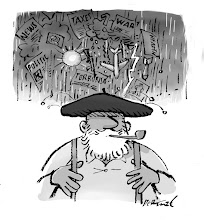
Horizon blue is a colour name which was used for the light blue uniforms of French troops from 1915 through 1921.

The colour’s name refers to the indefinable shade of blue which separates the sky from the earth, which had been previously used in the world of fashion. Despite a relatively short production, the light blue beret became very popular as a ‘reality shield’ with the troops, and many soldiers wore it until the end of the war and long after.

Fast forward a century and they’re back, in a range of diameters, pure raw cotton lined and carrying its own label, emphasizing the protective capabilities of these berets!

The Bérets Bleu Horizon come in three diameters: ≈27cm, ≈29cm, ≈31cm and a Chasseur Alpin model in ≈33cm.

All in the same quality merino wool, cotton lined and fitted with the Boneteria Aotearoa Bleu Horizon woven label.
























